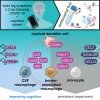pooriepoor91
Established Member
Highlights
Natural history and mechanisms for persistent cognitive symptoms (“brain fog”) following acute and often mild COVID-19 are unknown. In a large prospective cohort of people who underwent testing a median of 9 months after acute COVID-19 in the New York City/New Jersey area, we found that cognitive dysfunction is common; is not influenced by mood, fatigue, or sleepiness; and is correlated with MRI changes in very few people. In a subgroup that underwent cerebrospinal fluid analysis, there are no changes related to Alzheimer’s disease or neurodegeneration. Single-cell gene expression analysis in the cerebrospinal fluid shows findings consistent with monocyte recruitment, chemokine signaling, cellular stress, and suppressed interferon response—especially in myeloid cells. Longitudinal analysis shows slow recovery accompanied by key alterations in inflammatory genes and increased protein levels of CXCL8, CCL3L1, and sTREM2. These findings suggest that the prognosis for brain fog following COVID-19 correlates with myeloid-related chemokine and interferon-responsive genes.
- •
Improvement from post-COVID-19 cognitive impairment (CI) is slow - •
Post-COVID-19 CI is molecularly distinct from Alzheimer’s disease - •
Post-COVID-19 CI is associated with CSF monocyte recruitment and gene alterations - •
Improvement from post-COVID-19 CI is linked to greater CSF interferon responses
Natural history and mechanisms for persistent cognitive symptoms (“brain fog”) following acute and often mild COVID-19 are unknown. In a large prospective cohort of people who underwent testing a median of 9 months after acute COVID-19 in the New York City/New Jersey area, we found that cognitive dysfunction is common; is not influenced by mood, fatigue, or sleepiness; and is correlated with MRI changes in very few people. In a subgroup that underwent cerebrospinal fluid analysis, there are no changes related to Alzheimer’s disease or neurodegeneration. Single-cell gene expression analysis in the cerebrospinal fluid shows findings consistent with monocyte recruitment, chemokine signaling, cellular stress, and suppressed interferon response—especially in myeloid cells. Longitudinal analysis shows slow recovery accompanied by key alterations in inflammatory genes and increased protein levels of CXCL8, CCL3L1, and sTREM2. These findings suggest that the prognosis for brain fog following COVID-19 correlates with myeloid-related chemokine and interferon-responsive genes.

